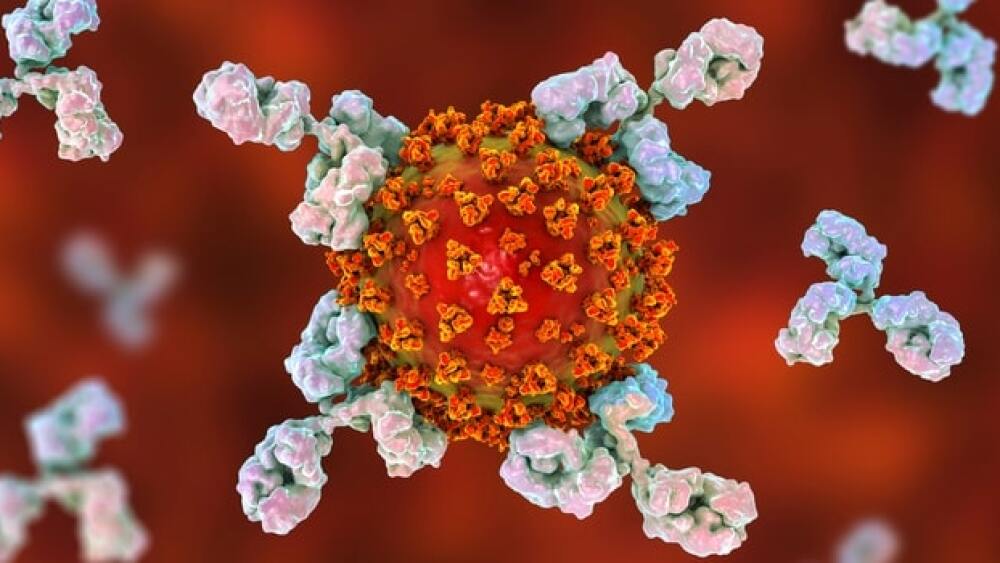Although still preliminary, Regeneron Pharmaceuticals announced early data from its Phase I/II/III trial of its antibody cocktail, REGN-COV2, against COVID-19.
Although still preliminary, Regeneron Pharmaceuticals announced early data from its Phase I/II/III trial of its antibody cocktail, REGN-COV2, against COVID-19. The analysis demonstrated the cocktail of two antibodies against SARS-CoV-2 decreased viral load and alleviated symptoms faster in non-hospitalized COVID-19 patients. It also demonstrated positive trends in decreasing medical visits. The study is still ongoing.
Regeneron and the U.S. National Institute of Allergy and Infectious Diseases (NIAID) announced the launch of the Phase III part of the trial in July, and in early August issued a scientific study demonstrating the cocktail was able to “almost completely block establishment of virus infection,” in rhesus macaques and hamsters. The new study is analysis of early data in the clinical trial in patients with COVID-19.
Using its proprietary VelocImmune mice, Regeneron screened thousands of fully-human antibodies. The mice have been genetically modified to have a human immune system. They also evaluated antibodies isolated from people who have recovered from COVID-19. They then chose the two most potent, non-competing antibodies that were most effective at neutralizing SARS-CoV-2. They then scaled up the dual-antibody cocktail for clinical use with the company’s own VelociMab and manufacturing capabilities.
Other parts of the larger trial involve studying the antibody cocktail in hospitalized COVID-19 patients and in prevention of infections in people exposed to COVID-19 patients.
“After months of incredibly hard work by our talented team, we are extremely gratified to see that Regeneron’s antibody cocktail REGN-COV2 rapidly reduced viral load and associated symptoms in infected COVID-19 patients,” said George D. Yancopoulos, president and chief scientific officer of Regeneron. “The greatest treatment benefit was in patients who had not mounted their own effective immune response, suggesting that REGN-COV2 could provide a therapeutic substitute for the naturally-occurring immune response.”
The data analyzed so far was in 275 patients out of the 1,000 that have been enrolled in that particular trial. Jeanne Marrazzo, the director of the division of infectious diseases at University of Alabama at Birmingham, told CNN the data was “very promising.”
Marrazzo added, “What I think is fascinating is that it shows that antibodies really matter and the antibody to the spike protein was really helpful, particularly when people made the antibodies themselves. Whether it’s antibody therapy or vaccine that target these proteins, it sounds like we are on the right track. I think that’s really encouraging.”
The data analyzed also suggested the antibodies decreased the amount of virus found in patients’ throats. This suggests, although doesn’t yet prove, that the antibody cocktail decreases the risk of infecting other people.
The data was presented in a press release, rather than a scientific study, although Regeneron indicates that it is coming, which will provide more information about who was enrolled in the trial and how the demographics compare to the general population. The data did not show any safety concerns. It did say that out of the 275 patients, 56% were Hispanic, 13% African American and 64% had one or more underlying risk factors, including obesity (more than 40%). The average age of the patients was 44 years. In total, 49% were male, 51% female.
“There’s nothing bad about these results, you just can’t say much about how transformative this is going to be,” Eric Topol, director of the Scripps Research Translational Institute, told STAT. He doesn’t believe the data should be enough yet for the U.S. Food and Drug Administration (FDA) to grant emergency use authorization (EUA), although Regeneron indicates they plan to talk to the regulatory agency.
In this part of the trial, patients received either placebo, 2.4 grams of REGN-COV2 or 8 grams of the cocktail, which is dosed intravenously. The patients receiving the high dose had viral levels decrease by 0.60log10 copies of the virus per milliliter compared to placebo after seven days. This was deemed statistically significant. The lower dose group decreased viral load by 0.23log10, but this was not classified as statistically significant.
On September 16, Eli Lilly and Company announced interim proof-of-concept data from its BLAZE-1 Phase II trial of LY-COV555, its neutralizing antibody therapy for COVID-19. It enrolled mild-to-moderate COVID-19 patients who had recently been diagnosed in the outpatient setting and received either placebo, 700 mg, 2800 mg and 7000 mg of the antibody.
Analysis of the data showed that the antibody improved viral clearance around the third day, which was earlier than the controls. It also decreased the proportion of patients who had persistently high viral loads at other periods.
You can’t really compare data from two different studies and two different therapeutics, but both antibody products show promise in slowing COVID-19 and helping patients recover quicker.
There are at least 70 different antibody treatments being evaluated, according to BIO, the biotechnology industry association.
In a call with company shareholders yesterday, George Yancopoulous, Regeneron co-founder, indicated the regulators had to decide if this was enough information for an emergency use authorization. “I think that this deserves to be discussed with regulatory authorities, because of all of the societal implications. We think that there’s a lot of evidence here to suggest that this is a therapeutic solution that could really benefit quite a number of individuals and patients.”





